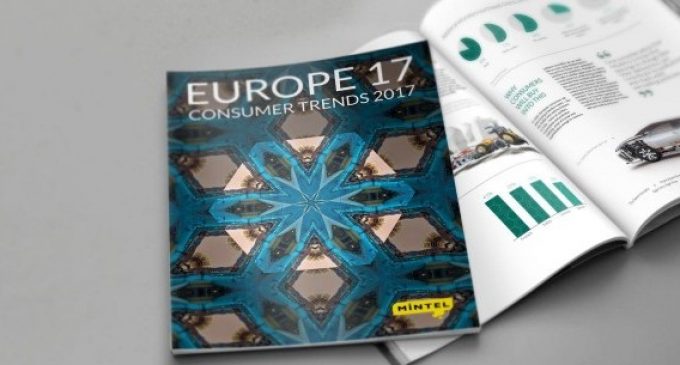Four Key European Consumer Trends For 2018

Mintel has revealed the key consumer trends set to impact Europe in 2018. Over the coming year:
- Consumers will take to the seas to reel in recycling as a new wave of marine conservation emerges.
- Digital disclosure legislation and hacks will see Europeans safeguard their data – and ask more for sharing it.
- Expect to see teenage kicks squarely aimed at those encroaching on their anxiety levels as teens look to brands to build their confidence.
- Fuelled by post-truth politics and fake news, transparency will be the watchword of 2018 as Europeans take up their tools in the pursuit of facts, facts, facts.
Looking ahead to 2018, Mintel’s Senior Trend Consultant Richard Cope and Manager of Trends, EMEA Catherine Cottney explore the key consumer trends set to shake up the market, including implications for both consumers and brands.
SEA CHANGE
Ocean plastic fashion and recycled packaging launches, ingredient bans and activism are focusing consumer and government attention on maritime conservation.
Richard Cope, Senior Trends Consultant at Mintel, says: “In the coming year, lobbying campaigns will make consumers more aware of ocean plastic and its impact on wildlife and their own health, while politics will focus European consumer attention on marine conservation. More and more brands will offer education and leadership with clean, safe and sustainable products, as they seek to highlight, and safeguard, the purity and future supply of their ocean ingredients.”
He continues: “Whilst plastics won’t be wholly demonised, intensified eco-lobbying will produce more recyclable products, as well as incentives and initiatives to encourage sustainable behaviour. We may well see social stigmatisation of plastic cups and cling film, more pioneering brands innovating with soluble pod packaging and more retailers dispensing with it completely. In food, drink and beauty, we’ll see pure, unpolluted sourcing mainstream as a claim and natural exfoliators like salt and sand championed alongside other sustainable marine ingredients. Fashionable, premium ocean plastic products will promote this trend in the coming year, with half (49%) of UK consumers saying they would be interested in buying fashion items made wholly or partially from recycled plastic.”
SHAREHOLDERS
Hacks and data disclosure legislation form a new breed of consumers who will hold on tight to their data and demand something in return before sharing it.
Richard Cope explains: “The data consumers are generating is escalating, but it’s creating vulnerabilities, as high-profile hacks have shown. In response, consumers will protect themselves with software and behaviours learned from the more streetwise, private approach of younger generations. At the same time, governments are providing protection, with the UK seeking to emulate the EU’s General Data Protection Regulation (GDPR) legislation, which from May 2018, will compel all businesses to seek consumer consent, disclose tracking and offer the right to be forgotten, when it comes to data disclosure. This effectively reboots the digital settings of the brand-consumer relationship and from now on brands will need to proffer economically or personally compelling incentives for consumers to resume sharing their information with them.”
He adds: “As data creation grows in new forms – whether it is biometrics, geolocation apps or the Internet of Things (IoT) – more trusted outsider brands will enter the protection market. Looking ahead, newly empowered consumers will benefit as brands solicit them. Whilst discounting for data schemes will mainstream, we’ll also see more creative data-sharing initiatives that help consumers to save time and better monitor their health or their utilities spending. Wearable devices and smart TVs present major opportunities here, but companies will need to incentivise consumers to raise their ownership levels as less than one in 10 Spanish (9%), Italian (7%), French (6%) and German consumers (6%) own a smartwatch.”
TEENAIDERS
Teens are increasingly defined by anxieties around image, health and work, and are looking for brands to alleviate the pressure and help them build both their confidence and prospects.
Catherine Cottney, Manager of Trends at Mintel, says: “Pan-European studies reveal the economic, digital and emotional pressures facing today’s youth, demanding a response from consumer-facing brands. We’re starting to see automation encroach on youth employment prospects. Additionally, there is a growing understanding of the digital pressures facing young people, and how parents are adding to these problems. Mental health issues are becoming more prevalent among teens. Mintel research finds a quarter (25%) of 7-15 year olds in the UK are concerned about their future after school, with 24% concerned about their appearance. Social media usage is being held as a main contributor.”
She elaborates: “Switching off completely from digital platforms is not the answer as these channels can be utilised to raise awareness and quickly connect young consumers with the help they need. With a growing level of attention around the negative impact of social media, this generation will seek to take back greater control by being more mindful of their usage. They will be quick to call out brands promoting unrealistic beauty ideals and quick to support those embracing diversity. In 2018 and beyond, brands have an opportunity to step in and provide solutions to help empower this cohort.”
ACCOUNTANTS
In a world of post-truth politics and unsubstantiated media, consumers are looking for brands to court them with transparency, simplicity and evidence.
Catherine Cottney says: “Consumer distrust in governments and media is spreading to companies, and so is the clamour for truth and transparency in ingredients and behind-the-scenes processes. More and more companies will take an ‘open kitchen’ approach and use their packaging, portals and premises to practise truth and transparency. Consumers are utilising the tools at their disposal to keep an eye on what companies are doing, with Mintel research indicating that at least half of Polish (60%), German (54%) and French (50%) consumers agree that the increased ability of consumers to communicate and find information, for instance via social media and the internet, is forcing companies to be more transparent.”
“Quantified and qualified facts will be in high demand and consumers will expect greater transparency as standard, whether this is related to manufacturing processes or how efficacious a product is. In terms of marketing, there will be a push for greater authenticity; consumers are set to see behind-the-scenes revealed through creative campaigns that put employees to the fore and capitalise on their years of expertise. With consumers more able to question and query the actions of brands, radical transparency will be the watchword for 2018 as they try and show they can be relied upon as trustworthy,” she concludes.




















